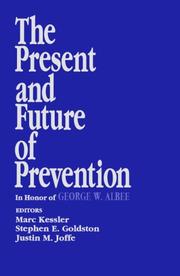| Listing 1 - 10 of 159 | << page >> |
Sort by
|
Book
ISBN: 0808910620 Year: 1978 Publisher: New York (N.Y.) : Grune and Stratton,
Abstract | Keywords | Export | Availability | Bookmark
 Loading...
Loading...Choose an application
- Reference Manager
- EndNote
- RefWorks (Direct export to RefWorks)
Book
ISBN: 2738156835 Year: 2021 Publisher: Paris : Odile Jacob,
Abstract | Keywords | Export | Availability | Bookmark
 Loading...
Loading...Choose an application
- Reference Manager
- EndNote
- RefWorks (Direct export to RefWorks)
Dépressions, stress post-traumatique, anxiété, insomnie ...: infectée ou non par le virus de la Covid-19, près d'une personne sur cinq développera des troubles psychiatriques. Ces symptômes ne sont pas seulement liés aux effets délétères de la pandémie. Ils sont l'expression de l'infection elle-même et de l'inflammation qu'elle entraîne, notamment dans le cerveau. Les mécanismes en jeu, d'une grande complexité, constituent un nouveau domaine d'exploration pour la recherche. Avec leurs causes identifiables, les maladies mentales sont des maladies comme les autres. Si, comme nous l'enseigne l'immuno-psychiatrie, nous ne sommes pas égaux face aux infections et au risque de développer des maladies mentales, nous pouvons tous apprendre à réduire ce risque. Les acquis de la psychologie, les outils qu'elle met à notre disposition peuvent améliorer notre résilience. Ainsi, l'épidémie rebat les cartes, tant pour les individus que pour la psychiatrie elle-même, déjà sinistrée, qui doit gérer cet autre désastre sanitaire. Une chance pour elle de se réinventer?.
Book
ISBN: 9791034606962 Year: 2021 Publisher: Nimes : Champ social éditions,
Abstract | Keywords | Export | Availability | Bookmark
 Loading...
Loading...Choose an application
- Reference Manager
- EndNote
- RefWorks (Direct export to RefWorks)
D'entrée de jeu, Hervé Bokobza dit ceci : un humain tout seul, ça n'existe pas. Plus encore : ça a un poids, une gravité. Mais lorsqu'un système de santé est organisé sur le modèle d'une usine de voitures, un humain ne vaut plus que par le capital qu'il génère pour les actionnaires dont le désir insensé se voit traduit par les "experts" , ces mandarins quifont du Savoir Médical l'instrument d'une Vérité totalitaire.
Book
ISBN: 1498541143 Year: 2017 Publisher: Lanham, Maryland : Lexington Books,
Abstract | Keywords | Export | Availability | Bookmark
 Loading...
Loading...Choose an application
- Reference Manager
- EndNote
- RefWorks (Direct export to RefWorks)
Book
Year: 2004 Publisher: [Washington, D.C.] : U.S. General Accounting Office,
Abstract | Keywords | Export | Availability | Bookmark
 Loading...
Loading...Choose an application
- Reference Manager
- EndNote
- RefWorks (Direct export to RefWorks)

ISBN: 0415061768 Year: 1992 Publisher: London New York Tavistock/Routledge
Abstract | Keywords | Export | Availability | Bookmark
 Loading...
Loading...Choose an application
- Reference Manager
- EndNote
- RefWorks (Direct export to RefWorks)
Book
ISBN: 0394426223 0394735609 Year: 1980 Publisher: New York : Pantheon Books,
Abstract | Keywords | Export | Availability | Bookmark
 Loading...
Loading...Choose an application
- Reference Manager
- EndNote
- RefWorks (Direct export to RefWorks)
Mental health policy --- Mental health policy --- Psychiatry --- Psychiatry --- Philosophy --- Philosophy
Book
Abstract | Keywords | Export | Availability | Bookmark
 Loading...
Loading...Choose an application
- Reference Manager
- EndNote
- RefWorks (Direct export to RefWorks)
The United Nations Inter-Agency Task Force on the Prevention and Control of Non-communicable Diseases (NCDs) outlines its 2022–2025 strategy to address NCDs and mental health conditions globally. The plan emphasizes cooperation among UN entities, governments, and non-state actors to reduce the burden of diseases like cancer, diabetes, and heart disease, which account for 74% of global deaths annually. Key priorities include supporting countries in multisectoral actions, mobilizing resources, harmonizing efforts, and exemplifying UN reform. The strategy also addresses the exacerbated challenges posed by the COVID-19 pandemic and emphasizes the economic and health benefits of investing in NCD prevention and control. Targeting the Sustainable Development Goals (SDGs), the strategy seeks to strengthen governance and advocacy for NCDs and mental health, aiming for greater investment and capacity building within national frameworks.
Book
Abstract | Keywords | Export | Availability | Bookmark
 Loading...
Loading...Choose an application
- Reference Manager
- EndNote
- RefWorks (Direct export to RefWorks)
This policy brief addresses the intersection of mental health and the workplace, offering strategies based on WHO guidelines to improve mental health conditions for workers globally. It emphasizes the need for psychosocial risk management, mental health literacy, and supportive work environments. The brief targets policymakers, employers, and workers, highlighting the importance of safe and healthy work conditions as both a protective and risk factor for mental health. It discusses the impact of work-related stress, inequality, and job insecurity on mental health, and advocates for inclusive employment practices and mental health support structures. The brief aims to reduce stigma and improve participation and productivity of workers with mental health conditions.

ISBN: 0803945906 Year: 1992 Publisher: London Sage
Abstract | Keywords | Export | Availability | Bookmark
 Loading...
Loading...Choose an application
- Reference Manager
- EndNote
- RefWorks (Direct export to RefWorks)
| Listing 1 - 10 of 159 | << page >> |
Sort by
|

 Search
Search Feedback
Feedback About UniCat
About UniCat  Help
Help News
News